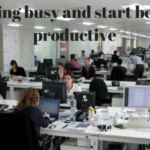
Being Busy

Westerners, especially workers here in the U.S., seem to be addicted to being busy. We derive self-importance from being busy and even choose to wear it as a badge of honor.
What are we busy doing: attending meetings, putting out proverbial fires, dealing with personnel, doing paperwork? As we are busy doing these tasks, how effectively are we moving through them?
Have you noticed when you have a deadline, you always find a way to get things done in the time allotted? If you have a mountain of tasks to complete the day before you leave for vacation, that day becomes incredibly productive. Why? Because you have no other option. If you want to go away you rise to the occasion and find a way to get it all done. If you worked this effectively every day, you could complete your tasks and move on to other things.
Workaholics
Most employers love workaholics, at least initially. They immerse themselves in their work and push everything else off to the side. The challenge is that as time goes on, they are likely to have external factors affect their work. If the workaholic spends too little time with his family, there’s a greater chance of family issues like divorce or troubled children. As these hardships present themselves, the personal turmoil they experience is likely to impact performance at work. Long-term they often burn themselves out. The balanced employee may not spend as many hours in the office or devote all of their spare time obsessing on business, but by balancing their time, they become more resilient. They recover from difficulties faster, have fewer illnesses through their ability to handle stress, and suffer less burn out because their minds are not completely consumed by work. This means they can ultimately prolong their career. Great employees that stay for decades help their companies thrive for the long term. Lower turnover results in fewer disruptions and greater productivity for the organization.
The curse of technology
Technology, and the efficiency of exchanging information, can force people to never escape work. Managers often expect immediate responses to texts, emails, or phone calls even after hours. As a manager, do what you can to provide the space and recovery time your people need. As an employee, find subtle, tactful ways to let your manager know that you will not be monitoring your devices in order to spend quality time with your family, your friends, or an activity you enjoy. No matter how great your work situation may be, we all need an opportunity to recharge our batteries.
Learning to say no tactfully
One of the reasons we often get busy is because someone asks us to do something, and we don’t want to disappoint them. Some might suggest that you just say “No.” “No” is often not the best answer, but if saying “yes” puts tremendous hardship on you, perhaps there is a better solution: “I can’t do that, but I can do this.” If a colleague needs something in a week and your workload does not allow for it, your response might be, “I can’t have everything you need by this Friday, but I can get it to you by next Friday” or, “I can have the first section to you by this Friday but the whole project will take until next Friday.” Show that you are flexible, but do not allow yourself to become a door mat.
Coming in early
The most productive people I’ve met in my life have been early risers. There’s something powerful about getting a jump on things before the rest of the world has begun their day. In the early morning there are fewer interruptions from coworkers and customers. With a family it’s often less disruptive to leave early than to come home late or disappear on weekends.
In the end being busy does not equate to being productive. Next time your work hours encroach on your personal time, ask yourself what you could have done to have completed those tasks during normal office hours. In most cases you will find that if you had rearranged your priorities, delegated effectively, or been more productive during your work day, you would be enjoying more of the leisure time you deserve.





